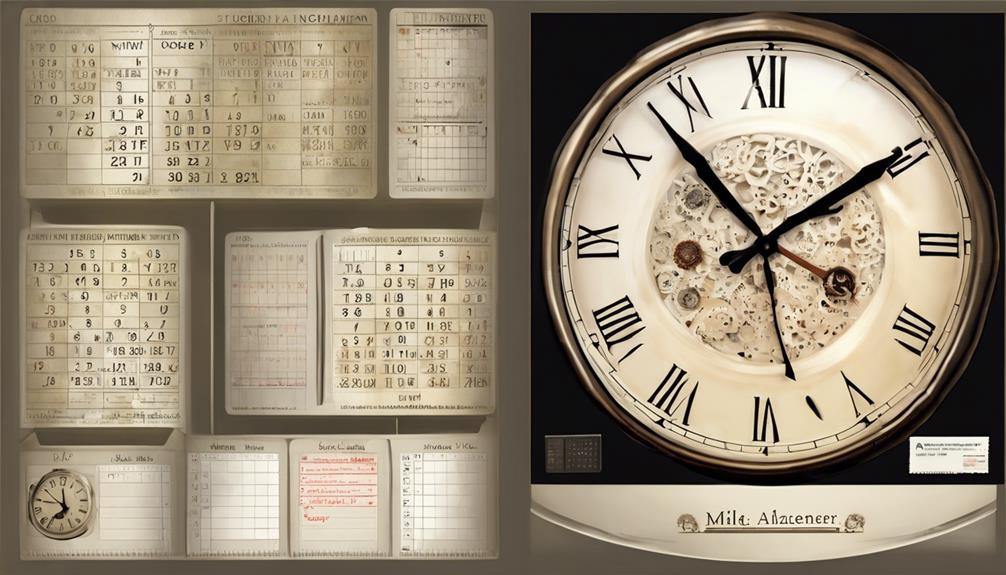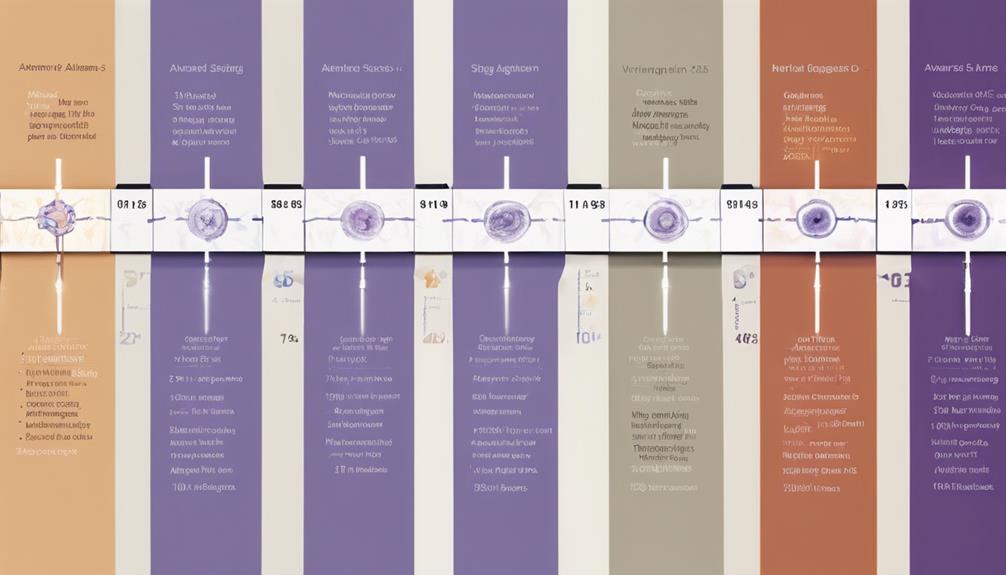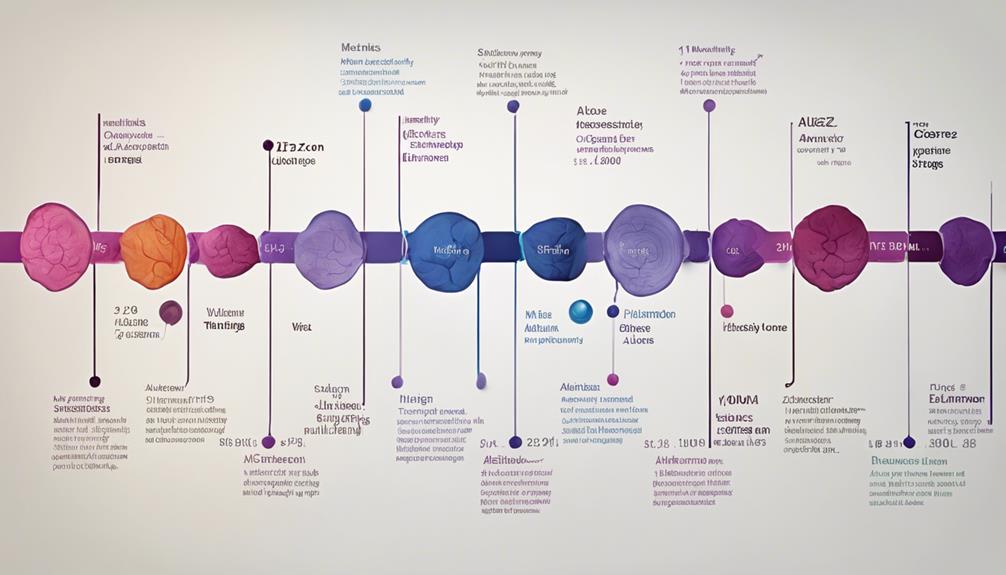Discovering the complex progression through the seven stages of Alzheimer’s disease reveals the many obstacles and intricacies faced by those affected by this condition.
As we navigate this terrain, questions arise about the temporal nature of each stage and the implications they hold for individuals and their loved ones. Join us on this voyage through the stages of Alzheimer's, where illumination awaits those seeking clarity amidst the shadows of this condition.
Key Takeaways
- Alzheimer's progression duration varies from years to decades, influenced by age, health, and genetics.
- Age significantly impacts speed, with older individuals at higher risk of faster advancement.
- Caregivers play a crucial role in very severe decline, ensuring quality of life and preventing complications.
- Support from caregivers, care facilities, and hospice is essential in advanced Alzheimer's stages.
Duration of Preclinical Stage
The preclinical stage of Alzheimer's typically starts 10-15 years before noticeable symptoms manifest, during which changes in the brain occur without apparent signs. This stage is characterized by the accumulation of amyloid plaques and tangles in the brain, which can be detected using imaging technology. Additionally, biomarkers found in blood samples can indicate the risk of developing Alzheimer's during this phase. Regular primary care visits play a crucial role in the early detection of Alzheimer's in the preclinical stage, allowing for timely intervention and management strategies to be implemented.
Imaging technology, such as PET scans and MRIs, can visualize the presence of amyloid plaques and tangles in the brain, providing valuable insights into the progression of Alzheimer's disease before symptoms become evident. Biomarkers, including levels of certain proteins in the blood, offer further opportunities for early detection and monitoring of the disease. By leveraging these tools in conjunction with routine primary care visits, healthcare providers can better identify individuals at risk for Alzheimer's and initiate appropriate interventions to potentially delay or manage the onset of symptoms.
Length of Mild Cognitive Impairment Phase

The length of the Mild Cognitive Impairment (MCI) phase in Alzheimer's disease varies, ranging from a few years to an indefinite duration.
While some individuals progress from MCI to dementia, not everyone with MCI develops Alzheimer's.
Typically, individuals transition to dementia within 5 to 7 years on average.
Duration of Forgetfulness
During the mild cognitive impairment (MCI) phase, the duration of forgetfulness can significantly vary among individuals. Some may experience it for a few months, while for others, it may last several years. MCI represents an early stage of Alzheimer's disease where memory lapses are noticeable but don't notably affect daily functioning.
Monitoring the progression of forgetfulness during MCI is crucial for early detection and implementing intervention strategies. Factors like age, overall health, and lifestyle habits can influence the length of the forgetfulness phase in MCI.
Progression to Dementia
Moving from the phase of forgetfulness in mild cognitive impairment (MCI), individuals may experience a progression towards dementia that can vary in length. On average, MCI can last around 7 years before progressing to dementia in some cases.
However, it's essential to note that not all individuals with MCI will progress to dementia; some may remain stable or even revert to normal cognitive function. The duration of the MCI phase varies widely, ranging from a few years to over a decade, depending on the individual.
Regular monitoring and assessment of cognitive function are crucial in tracking the progression from MCI to dementia. Early detection and timely intervention during the MCI phase can potentially slow down or delay the progression to full-blown dementia.
Timeline for Mild Dementia Stage
In the mild dementia stage of Alzheimer's, it's crucial to identify early symptoms and monitor the rate of progression. This stage typically lasts for several years and is characterized by memory loss, difficulties with problem-solving, and changes in personality.
Individuals may start needing assistance with daily activities and expressing their thoughts during this critical phase of cognitive decline.
Early Symptoms Identification
Identifying early symptoms of mild dementia in Alzheimer's involves recognizing memory lapses, challenges with words, and disruptions in daily routines.
- Memory Lapses: Forgetfulness regarding recent events or conversations.
- Difficulty with Familiar Words: Struggling to recall common words or names.
- Challenges in Social Tasks: Finding it hard to engage in social activities or follow conversations.
- Daily Routine Disruptions: Noticing significant changes in daily habits or tasks.
These signs may manifest subtly during the early stage of mild dementia. Loved ones might still be able to perform regular activities like driving or working, but disruptions in routines and social interactions could indicate the onset of Alzheimer's disease. Denial of symptoms by the individual may delay seeking help or intervention.
Progression Rate Monitoring
As we observe the progression from early symptoms to the mild dementia stage in Alzheimer's, monitoring the timeline for this phase involves closely tracking memory loss, cognitive decline, and challenges in daily functioning. During the mild dementia stage, lasting 2 to 4 years on average, individuals may face increasing difficulties with problem-solving, decision-making, and experience changes in personality and behavior. Caregivers play a crucial role in providing support, ensuring safety, and enhancing the quality of life for those in this stage. Here is a summary in the table below:
| Challenges | Mild Dementia Stage |
|---|---|
| Memory Loss | Increasing difficulty remembering recent events |
| Cognitive Decline | Struggling with problem-solving and decision-making |
| Daily Function | Facing challenges in daily tasks and routines |
Duration of Moderate Dementia Phase

The duration of the moderate dementia phase in Alzheimer's disease typically extends over several years, marked by a progressive decline in cognitive function and increased reliance on support for daily activities. During this phase:
- Individuals experience worsening cognitive impairments, including significant memory loss and confusion.
- Challenges with daily activities become more pronounced, requiring increasing levels of assistance and support.
- Behavioral changes, wandering tendencies, and personality alterations are common features.
- Caregivers play a crucial role in providing care and managing the complexities of this stage.
As the disease progresses, individuals in the moderate dementia phase may exhibit a range of symptoms that impact their daily life and interactions. Understanding the duration and characteristics of this phase is essential for caregivers and healthcare providers to offer appropriate support and assistance tailored to the specific needs of individuals with Alzheimer's disease.
Length of Severe Dementia Stage

During the severe dementia stage of Alzheimer's disease, individuals may endure an extended period of several months to several years, necessitating round-the-clock personal care and support. This stage is marked by a significant decline in mental and physical abilities, making individuals highly dependent on caregivers for their daily needs.
Communication becomes increasingly challenging, impacting interactions with others. Caregivers play a crucial role in providing specialized care, often involving hospice support, to ensure comfort and dignity for those in this stage.
Due to a weakened immune system, individuals are more vulnerable to infections like pneumonia, emphasizing the importance of proper hygiene practices. Providing a safe and supportive environment is essential during the severe dementia stage to ensure the well-being of individuals as they navigate through this challenging phase of Alzheimer's disease.
Timeline for Very Severe Decline

Moving from the severe dementia stage to the very severe decline stage of Alzheimer's disease signifies a critical shift in the individual's level of functional independence and care needs.
During the very severe decline stage, which can span several years, individuals experience a significant decline in basic abilities like eating and walking, necessitating extensive caregiver assistance.
This advanced stage often requires the support of professional care facilities or hospice care to ensure the individual's comfort and well-being.
Caregivers play a pivotal role in maintaining the quality of life for those in this stage, providing essential physical and emotional support.
Additionally, individuals in the very severe decline stage are highly vulnerable to infections such as pneumonia, highlighting the crucial need for proper care and hygiene practices to prevent complications and ensure the individual's well-being.
Total Duration of Alzheimer's Progression

Throughout the progression of Alzheimer's disease, individuals may experience varying durations in each of the 7 stages, influenced by factors such as age, overall health, and genetic predisposition. The total duration of Alzheimer's progression can range from several years to over two decades. Factors such as age, health, and genetics play a crucial role in determining the rate of progression through these stages. Age is particularly significant, with older individuals often facing a higher risk of faster progression.
—
| Factors that Influence Alzheimer's Progression | Impact on Duration |
|---|---|
| Age | Older individuals may progress through stages faster |
| Overall Health | Better health could potentially slow down progression |
| Genetics | Genetic predisposition may affect the speed of decline |
| Lifestyle Factors | Healthy lifestyle choices may impact disease duration |
| Treatment Efficacy | Effective treatments could extend time in each stage |
Frequently Asked Questions
What Is the Timeline for Alzheimer's to Death?
Alzheimer's timeline to death varies, with an average life expectancy of 4 to 8 years post-diagnosis. Some individuals live over 20 years after diagnosis, showing disease progression differences.
Progressing through the 7 stages spans years, each stage with unique challenges. Severe symptoms in late stages might require 24/7 care and increase infection risks.
Caregivers are vital for comfort and dignity, focusing on quality of life and support.
What Is a Symptom Commonly See in Stage 7 of Alzheimer's Disease?
In stage 7 of Alzheimer's disease, a common symptom is severe mental and physical impairment. Communication challenges become prominent, making interactions difficult.
Personality changes lead to heightened anxiety and frustration. Independence decreases, and individuals rely heavily on others for support.
End-stage symptoms include vulnerability to infections like pneumonia, necessitating round-the-clock care. It's crucial to provide compassionate support and understanding to those navigating this challenging phase.
How Bad Is Stage 7 Dementia?
Stage 7 dementia is a severe phase of Alzheimer's disease where individuals face significant cognitive decline, requiring extensive assistance with daily activities. Basic functions like eating and walking may be compromised, necessitating constant care. Recognizing faces and managing daily tasks become challenging.
Round-the-clock supervision is often needed, with vulnerability to infections like pneumonia. Providing oral care, reducing stress, and ensuring comfort are vital components of support at this critical stage.
What Is the Most Common Characteristic of End Stage Alzheimer's Dementia?
In end-stage Alzheimer's dementia, the most common characteristic is the pronounced decline in cognitive and physical abilities. Communication challenges worsen significantly, leading to increased frustration and anxiety.
Personality changes are prevalent, impacting interactions with others. Individuals become highly dependent on caregivers for daily tasks and care.
This stage marks severe mental and physical impairment, highlighting the need for supportive and compassionate care for those affected.
Conclusion
In conclusion, navigating the 7 stages of Alzheimer's is like embarking on a winding road trip with unpredictable twists and turns. Understanding the duration of each phase and being prepared for the journey ahead is crucial for both patients and caregivers.
By staying informed, seeking support, and embracing the challenges ahead, we can navigate this complex disease with resilience and compassion. Let's travel this road together, one stage at a time, knowing that we aren't alone.









